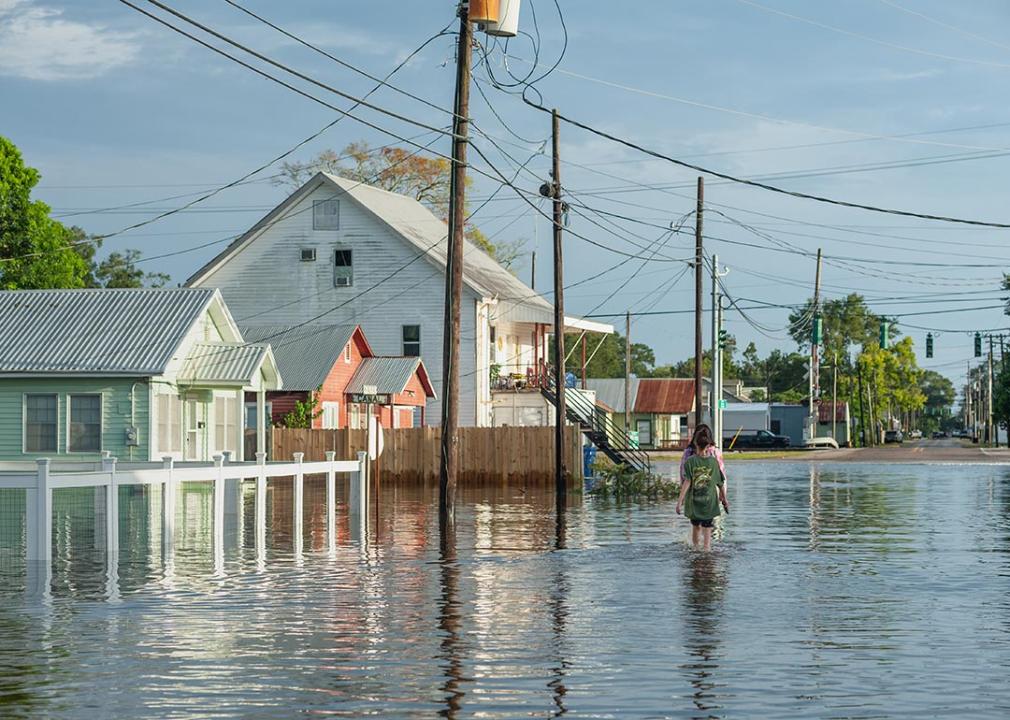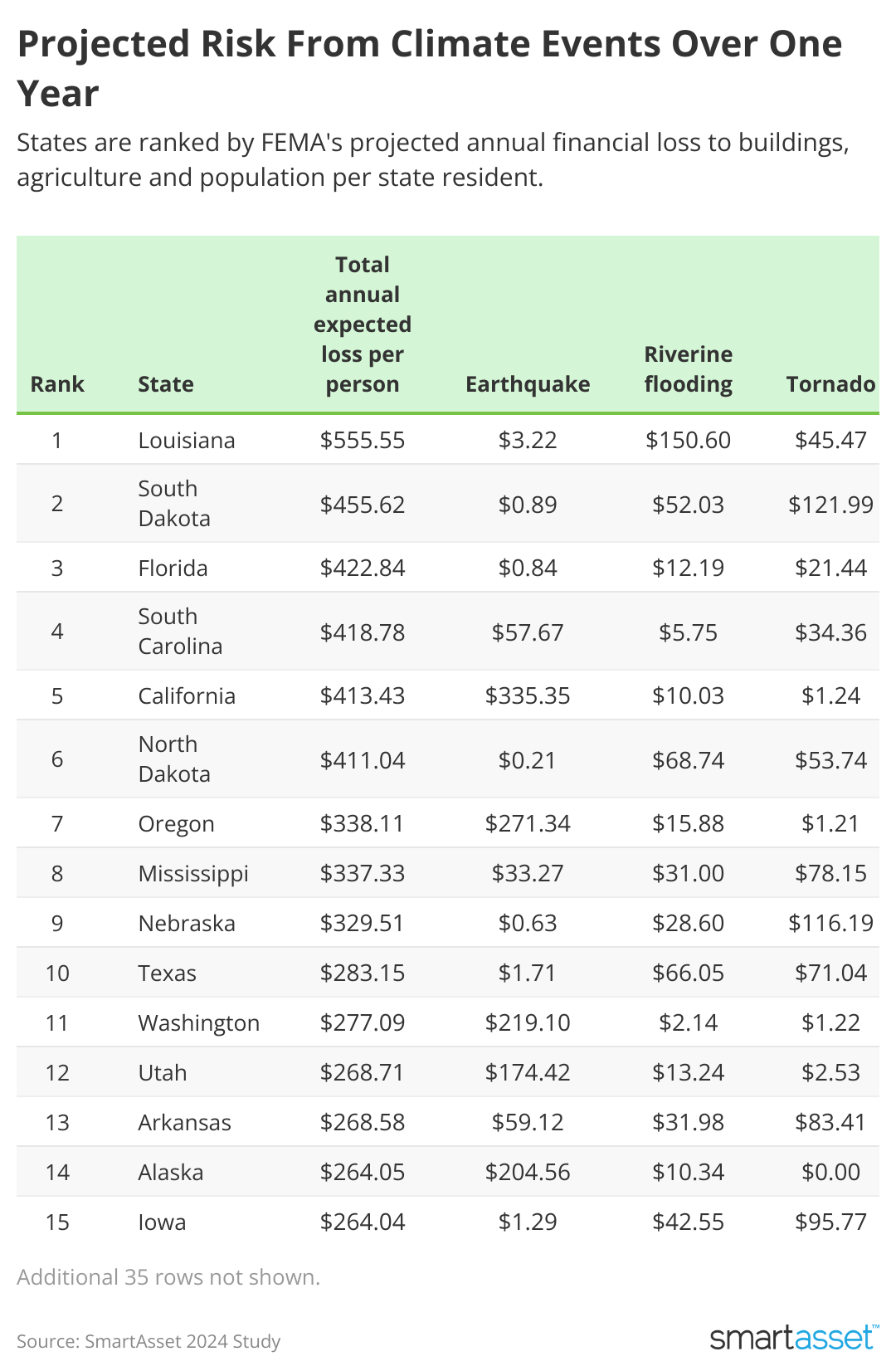10 states that will likely face the most financial losses from climate change

ccpixx photography // Shutterstock
10 states that will likely face the most financial losses from climate change
Person walking on flooded Canal street in Delcambre in Louisiana during Hurricane Laura.
With a variety of environmental events affecting the wide stretch of the United States, each state is subject to its own risks. Particularly, tornadoes, wildfires, hurricanes, flooding, landslides, lightning and drought, among other events, can cause damage to buildings, agriculture and individuals alike. When considering insurance, residents and business owners in each state should account for historic and projected losses due to environmental events in their financial plans.
With this in mind, SmartAsset set out to determine which states are most at financial risk due to various weather events. States were ranked by the total expected annual financial losses per person across all major environmental events according to the latest data from the Federal Emergency Management Agency (FEMA).
Key findings
- Louisiana is expected to lose $556 per resident to environmental damages per year. This is more than 20% more damage than second-place South Dakota ($456 per person). Most of Louisiana’s projected damages are due to riverine flooding, coastal flooding and hurricanes.
- Ohio and New York State are projected to be safest from environmental financial damages. Across all event types, Ohio residents may see as little as $64 in damages per person. For New York State, that figure is $69. New York’s biggest risk factors include drought and heat waves.
- New Jersey has the highest risk of damage from coastal flooding per person. Despite New Jersey’s high population density, residents may face an estimated $68 in damages per person per year. Delaware ranks second in this metric at $23 per person.
- Winters are most fierce in the Dakotas. Overall, South Dakota and North Dakota rank second and sixth for most projected damages per person. This is mostly due to having some of the highest projected damages per person for cold freezes, hail, ice storms and strong winds. South Dakota also has the most projected damages from tornadoes.
- California residents are most at risk for both drought and earthquake damage. Residents stand to lose $335 each to droughts within a year. When it comes to wildfires, the state has the sixth-highest projected damages per person.
- Nebraska is projected to withstand nearly double the hail damage as the second-most state. Residents might expect to see roughly $91 in damages per person, compared to the second-most South Dakota ($56 per person).
- Missouri is expected to see damages of $50 per person due to heat waves. This is most of any state. Nevada ranks second in this category with projected damages of $47 per person.
- Hurricane damage is one of the most expensive types of environmental occurrences. When it comes to hurricanes, Florida anticipates $363 in damages per person, most of any state. Louisiana has the second-most expected hurricane damages at $307 per person. South Carolina ($291) and North Carolina ($168) are also particularly at risk.
- Oregon has the highest risk of landslides. Landslides are projected to cost Oregonians $9 each. This is compared to second and third place West Virginia ($5 per person projection) and Idaho ($4 per person).
![]()

SmartAsset
Top 10 states with the highest projected annual losses per person due to weather events
Table showing projected risk from climate events over one year.
1. Louisiana
Total expected annual loss per person: $555.55
- Coastal flooding: $12.56
- Drought: $3.00
- Earthquake: $3.22
- Heat wave: $12.20
- Hurricane: $307.64
- Riverine flooding: $150.60
- Strong wind: $6.36
- Tornado: $45.47
- Wildfire: $2.77
- Winter weather: $0.62
2. South Dakota
Total expected annual loss per person: $455.62
- Coastal flooding: $0
- Drought: $0.68
- Earthquake: $0.89
- Heat wave: $3.75
- Hurricane: $0
- Riverine flooding: $52.03
- Strong wind: $48.62
- Tornado: $121.99
- Wildfire: $46.64
- Winter weather: $27.21
3. Florida
Total expected annual loss per person: $422.84
- Coastal flooding: $1.68
- Drought: $1.71
- Earthquake: $0.84
- Heat wave: $0.12
- Hurricane: $363.02
- Riverine flooding: $12.19
- Strong wind: $1.47
- Tornado: $21.44
- Wildfire: $12.53
- Winter weather: $0.02
4. South Carolina
Total expected annual loss per person: $418.78
- Coastal flooding: $1.09
- Drought: $1.12
- Earthquake: $57.67
- Heat wave: $2.75
- Hurricane: $291.05
- Riverine flooding: $5.75
- Strong wind: $8.25
- Tornado: $34.36
- Wildfire: $2.94
- Winter weather: $0.44
5. California
Total expected annual loss per person: $413.43
- Coastal flooding: $0.35
- Drought: $26.10
- Earthquake: $335.35
- Heat wave: $3.28
- Hurricane: $0.00
- Riverine flooding: $10.03
- Strong wind: $0.06
- Tornado: $1.24
- Wildfire: $36.05
- Winter weather: $0.03
6. North Dakota
Total expected annual loss per person: $411.04
- Coastal flooding: $0.00
- Drought: $0.83
- Earthquake: $0.21
- Heat wave: $5.43
- Hurricane: $0.00
- Riverine flooding: $68.74
- Strong wind: $57.74
- Tornado: $53.74
- Wildfire: $16.54
- Winter weather: $46.28
7. Oregon
Total expected annual loss per person: $338.11
- Coastal flooding: $10.31
- Drought: $0.14
- Earthquake: $271.34
- Heat wave: $1.68
- Hurricane: $0.00
- Riverine flooding: $15.88
- Strong wind: $0.34
- Tornado: $1.21
- Wildfire: $15.88
- Winter weather: $0.70
8. Mississippi
Total expected annual loss per person: $337.33
- Coastal flooding: $3.50
- Drought: $1.54
- Earthquake: $33.27
- Heat wave: $11.26
- Hurricane: $143.35
- Riverine flooding: $31.00
- Strong wind: $10.86
- Tornado: $78.15
- Wildfire: $6.30
- Winter weather: $1.09
9. Nebraska
Total expected annual loss per person: $329.51
- Coastal flooding: $0.00
- Drought: $15.10
- Earthquake: $0.63
- Heat wave: $1.89
- Hurricane: $0.00
- Riverine flooding: $28.60
- Strong wind: $38.24
- Tornado: $116.19
- Wildfire: $2.53
- Winter weather: $9.82
10. Texas
Total expected annual loss per person: $283.15
- Coastal flooding: $1.49
- Drought: $3.48
- Earthquake: $1.71
- Heat wave: $8.16
- Hurricane: $89.22
- Riverine flooding: $66.05
- Strong wind: $5.37
- Tornado: $71.04
- Wildfire: $8.26
- Winter weather: $1.96
Top 10 states with the lowest projected annual losses per person due to weather events
1. Ohio
Total expected annual loss per person: $63.89
- Coastal flooding: $0.05
- Drought: $0.02
- Earthquake: $3.55
- Heat wave: $1.90
- Hurricane: $1.16
- Riverine flooding: $11.31
- Strong wind: $5.31
- Tornado: $27.33
- Wildfire: $0.31
- Winter weather: $2.11
2. New York
Total expected annual loss per person: $68.89
- Coastal flooding: $4.53
- Drought: $0.08
- Earthquake: $2.78
- Heat wave: $4.55
- Hurricane: $29.92
- Riverine flooding: $12.03
- Strong wind: $4.09
- Tornado: $5.67
- Wildfire: $0.12
- Winter weather: $0.35
3. Arizona
Total expected annual loss per person: $73.00
- Coastal flooding: $0.00
- Drought: $5.95
- Earthquake: $15.96
- Heat wave: $9.86
- Hurricane: $0.05
- Riverine flooding: $7.73
- Strong wind: $1.09
- Tornado: $0.97
- Wildfire: $27.28
- Winter weather: $0.13
4. Pennsylvania
Total expected annual loss per person: $74.65
- Coastal flooding: $1.71
- Drought: $1.02
- Earthquake: $1.66
- Heat wave: $11.63
- Hurricane: $22.46
- Riverine flooding: $14.73
- Strong wind: $4.71
- Tornado: $10.13
- Wildfire: $0.19
- Winter weather: $1.11
5. Rhode Island
Total expected annual loss per person: $75.72
- Coastal flooding: $3.30
- Drought: $0.42
- Earthquake: $1.85
- Heat wave: $2.88
- Hurricane: $50.89
- Riverine flooding: $8.79
- Strong wind: $0.55
- Tornado: $4.22
- Wildfire: $0.08
- Winter weather: $0.05
6. Vermont
Total expected annual loss per person: $77.99
- Coastal flooding: $0.00
- Drought: $0.00
- Earthquake: $4.32
- Heat wave: $0.35
- Hurricane: $21.61
- Riverine flooding: $29.95
- Strong wind: $2.34
- Tornado: $5.72
- Wildfire: $0.52
- Winter weather: $1.71
7. Michigan
Total expected annual loss per person: $83.29
- Coastal flooding: $0.23
- Drought: $0.00
- Earthquake: $1.14
- Heat wave: $4.47
- Hurricane: $0.53
- Riverine flooding: $8.72
- Strong wind: $14.34
- Tornado: $41.74
- Wildfire: $0.52
- Winter weather: $1.02
8. Massachusetts
Total expected annual loss per person: $85.95
- Coastal flooding: $2.60
- Drought: $1.11
- Earthquake: $3.72
- Heat wave: $0.80
- Hurricane: $60.98
- Riverine flooding: $7.61
- Strong wind: $0.40
- Tornado: $5.07
- Wildfire: $0.24
- Winter weather: $0.08
9. West Virginia
Total expected annual loss per person: $87.36
- Coastal flooding: $0.00
- Drought: $0.19
- Earthquake: $2.01
- Heat wave: $0.78
- Hurricane: $8.28
- Riverine flooding: $45.04
- Strong wind: $6.21
- Tornado: $6.20
- Wildfire: $3.45
- Winter weather: $1.08
10. Connecticut
Total expected annual loss per person: $94.01
- Coastal flooding: $6.66
- Drought: $1.59
- Earthquake: $2.10
- Heat wave: $0.54
- Hurricane: $67.52
- Riverine flooding: $2.62
- Strong wind: $3.24
- Tornado: $5.70
- Wildfire: $0.06
- Winter weather: $0.19
Data and methodology
Expected annual loss estimates are normalized for each state’s population. Data comes from FEMA and includes projected costs in one year of agricultural, building, and population damage done by coastal flooding, cold wave, drought, earthquake, hail, heat wave, hurricane, ice storm, landslide, lightning, riverine flooding, strong wind, tornado, tsunami, volcanic activity, wildfire and winter weather.
This story was produced by SmartAsset and reviewed and distributed by Stacker Media.
